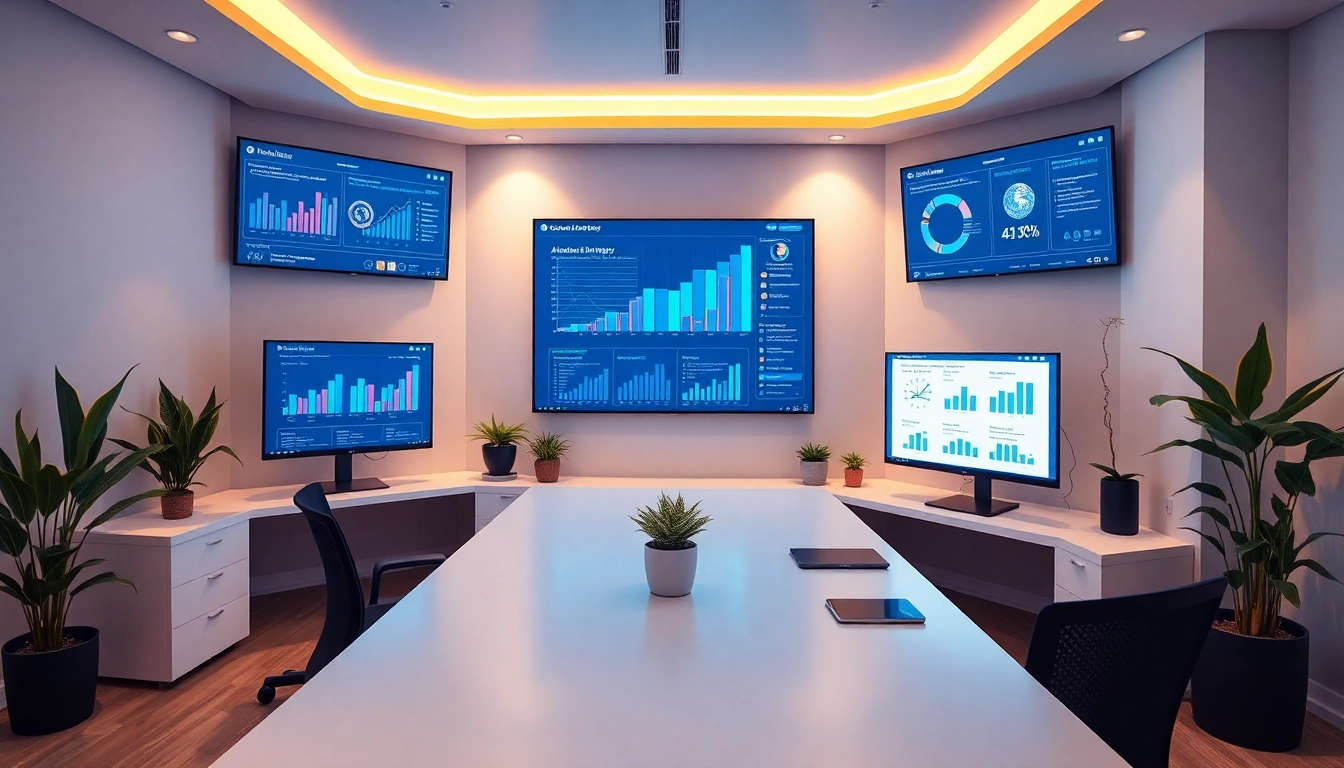
Understanding AI Marketing Agents
In today’s fast-paced digital landscape, businesses are constantly seeking innovative strategies to enhance their marketing effectiveness. One of the burgeoning trends is the utilization of AI marketing agents, sophisticated software tools designed to automate specific marketing tasks. These agents utilize artificial intelligence, combining machine learning and data analytics to provide unique marketing solutions that drive engagement, optimize campaigns, and improve customer experiences.
Definition and Functionality
An AI marketing agent serves as an autonomous software entity that performs marketing functions, such as data analysis, customer segmentation, and campaign optimization. These tools can operate with some degree of autonomy but typically require human oversight to ensure that their insights align with broader marketing strategies. By processing vast amounts of data at high speeds, AI marketing agents can derive actionable insights that human marketers may overlook.
Types of AI Marketing Agents
Various types of AI marketing agents exist, each designed to tackle specific marketing challenges. They include:
- Chatbots: These conversational agents enhance customer service by addressing inquiries and providing information efficiently.
- Predictive Analytics Tools: These agents analyze historical data to forecast future trends and customer behaviors, enabling marketers to tailor strategies that meet evolving demands.
- Customer Relationship Management (CRM) AI: Integrated into CRM systems, these agents optimize customer engagement through personalized marketing campaigns based on customer interactions and preferences.
- Content Generation Tools: Utilizing Natural Language Processing (NLP), these tools create engaging content for various platforms, adapting to audience preferences in real-time.
Benefits of Automation
Automation through AI marketing agents presents several advantages:
- Increased Efficiency: By automating routine tasks, these agents free up marketing teams to focus on strategy and creative execution.
- Enhanced Precision: AI agents help minimize human error by relying on data-driven insights, thereby optimizing campaign results.
- Cost-Effectiveness: Reduced manpower associated with manual tasks translates to lower operational costs and higher ROI.
- Scalability: Businesses can scale their marketing efforts without proportionately increasing resources, leading to rapid growth and adaptability.
Key AI Marketing Tools
Popular Software Solutions
Several AI marketing tools have gained recognition for their effectiveness in improving marketing operations. Here are some notable solutions:
- HubSpot: This all-in-one marketing platform utilizes AI to enhance inbound marketing practices, offering personalized content suggestions and lead scoring.
- Salesforce Einstein: Integrated within the Salesforce CRM, Einstein provides AI-driven insights that improve customer relationships and campaign performance.
- ContentBot: This tool helps marketers generate high-quality content quickly, aiding in SEO and social media efforts.
- AdRoll: Using AI, AdRoll assists businesses in retargeting campaigns while optimizing ad placements for better conversion rates.
Comparative Features
When evaluating AI marketing tools, it’s crucial to consider key features that align with business objectives:
- Data Integration: The ability to pull data from various sources for comprehensive analysis.
- Customization: Flexibility to personalize campaigns based on customer data and behavior.
- User Interface: A straightforward user experience that allows marketing teams to operate tools without extensive training.
- Analytics Capabilities: Robust reporting features that help measure campaign performance and decision-making impact.
Implementation in Business
Integrating AI marketing agents into business operations involves several steps:
- Define Objectives: Clear goals should be established to identify which marketing areas can benefit from AI implementation.
- Assess Tools: Evaluate various AI solutions based on pricing, features, and compatibility with existing systems.
- Train Teams: Ensure that marketing teams understand how to leverage these tools for maximum efficiency and effectiveness.
- Monitor Performance: Actively track the performance of AI-driven campaigns and adapt strategies based on insights drawn from analytics.
Maximizing Efficiency with AI
Task Automation Techniques
AI marketing agents can automate a variety of tasks, enhancing productivity. Common automation techniques include:
- Email Campaigns: Automation platforms can manage customer segmentation and schedule emails based on the optimal engagement times.
- Social Media Posting: Tools can schedule and publish posts across multiple platforms, maintaining a consistent brand voice without manual effort.
- Lead Scoring: AI algorithms can analyze lead behaviors to prioritize outreach efforts more effectively.
- Performance Reporting: Automated analytics generate performance reports, saving time and improving data visibility.
Real-Time Analytics
Implementing real-time analytics enables businesses to make informed decisions based on current data rather than outdated reports. Features of effective real-time analytics include:
- Immediate Feedback: Real-time insights allow marketers to adjust campaigns while they are in progress, optimizing effectiveness.
- Behavior Tracking: Analyze user interactions in real-time to tailor messaging and offers, thereby increasing conversion rates.
- Dashboards: Visual representations of data facilitate faster understanding and quicker decision-making.
Data-Driven Decision Making
With the power of AI-driven insights, businesses can leverage data to shape their marketing strategies effectively. This entails:
- Predictive Analytics: Using historical data to forecast customer behaviors and trends helps in tailoring marketing efforts.
- A/B Testing: Employing AI to automate A/B tests enables marketers to quickly ascertain which strategies resonate best with their audience.
- Customer Segmentation: Sophisticated algorithms can segment audiences based on various factors, enhancing targeted marketing campaigns.
Integrating AI Agents into Your Strategy
Steps for Successful Integration
For companies looking to successfully integrate AI marketing agents into their strategies, follow these critical steps:
- Identify Challenges: Understand what marketing problems you aim to solve with AI automation.
- Select Appropriate Tools: Choose tools that align with identified objectives and are capable of handling the depth of analytics required.
- Implement Training Programs: Ensure continuous learning for your marketing teams to fully harness AI capabilities.
- Establish Regular Reviews: Schedule periodic assessments to evaluate the integration’s effectiveness and make necessary adjustments.
Measuring Performance and ROI
Measuring the performance and return on investment (ROI) from AI marketing agents requires tracking specific metrics that demonstrate their value. Key performance indicators (KPIs) include:
- Conversion Rates: Monitor how many leads converted due to automated campaigns versus traditional methods.
- Customer Engagement: Assess metrics related to user interaction, including email open rates, click-through rates, and social media interactions.
- Cost Savings: Calculate how much time and resources have been saved by implementing AI-driven solutions.
- Lead Generation: Analyze the number of qualified leads generated through AI optimized campaigns over a specific period.
Case Studies of Successful Implementations
Numerous businesses across various industries have successfully adopted AI marketing agents. Notable examples include:
- Sephora: By employing chatbots to guide users through their product range, Sephora has enhanced customer onboarding and satisfaction.
- Amazon: With robust predictive analytics, Amazon tailors recommendations based on customer behavior, significantly boosting sales.
- Spotify: Utilizing AI, Spotify curates personalized playlists, which increases user engagement and retains subscriptions.
The Future of AI in Marketing
Emerging Trends and Technology
As technology evolves, so does the functionality of AI marketing agents. Looking ahead, emerging trends include:
- Personalization: The future of AI in marketing will see even deeper levels of personalization, tailoring experiences not just to segments, but to individual preferences.
- Voice Search Optimization: As voice search grows in popularity, AI tools will increasingly adapt content strategies for voice-activated queries.
- Augmented Reality Integration: AI will enable new marketing strategies using AR, allowing more interactive and engaging customer experiences.
Predictive Analytics in Marketing
Predictive analytics will continue to play a pivotal role in strategic marketing decision-making. The ability to analyze patterns in consumer behavior will allow businesses to not only forecast trends but also engage users before they even express needs.
Challenges and Considerations
Integration of AI marketing agents isn’t without challenges. Businesses must consider:
- Data Privacy Concerns: With increased automation comes greater responsibility for data management and protection.
- Implementation Costs: While AI can drive efficiency, initial integration can require significant investment in technology and training.
- Human Oversight: Balancing automation with human creativity is essential to ensure campaigns resonate with target audiences and maintain brand integrity.






